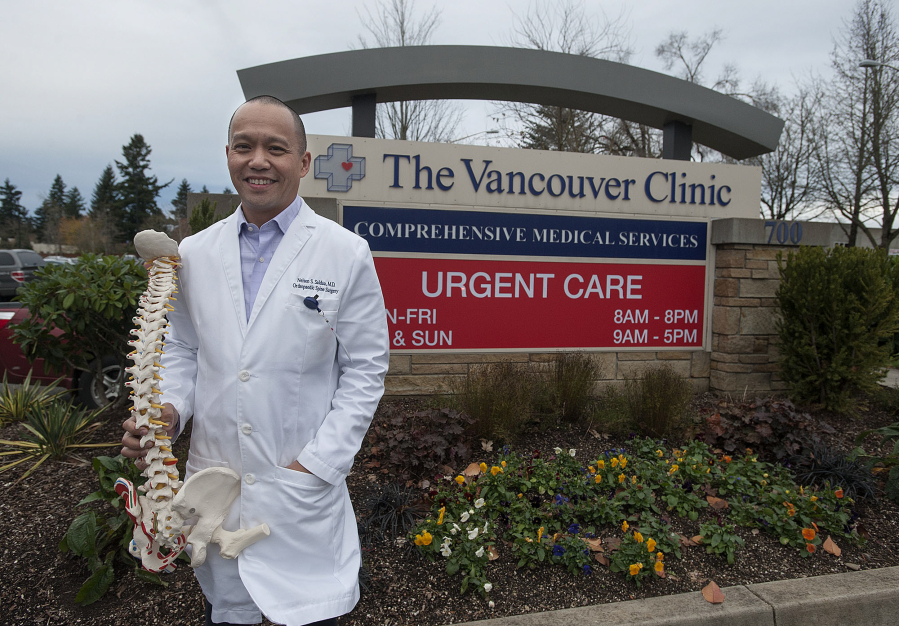If you asked a college-aged Nelson Saldua how his career path would look, he wouldn’t have forecasted much of his life accurately. About the only thing a 20-something Saldua would have gotten correct was that he would become a doctor.
College student Saldua never would have imagined the now-42-year-old would attend military medical school, spend 14 years in the Navy — including two wartime deployments — and move from sunny California to the wet Northwest for his post-military life. And while young Saldua knew he would be a doctor, he wouldn’t have guessed he would become an orthopedic surgeon specializing in spine surgery.
“I did think I was going to be a pediatrician,” he said. “I’d make a terrible pediatrician, I realized.”
Growing up, Saldua always had an interest in science and knew early he would become a physician.
“Maybe some of it was my parents’ brainwashing me to become a doctor,” Saldua said.
During medical school rotations, Saldua realized pediatrics wasn’t for him. Orthopedic surgery, however, piqued his interest. It’s one of the most definitive areas of medicine, Saldua said. If something is broken, you fix it with rods, plates and screws.
“It just made sense to me,” he said. “And the power tools are great.”
Now at The Vancouver Clinic, Saldua specializes in spine surgery.
Most often he sees patients with disc herniation and disc bulges, which can cause painful symptoms in arms, legs or anywhere else the pinched nerve goes. Alleviating the pressure on those nerves takes away the painful symptoms and allows the person to return to their normal life, Saldua said.
“Operating on the spine can be very stressful, but it can be very rewarding,” Saldua said.
“You can really make a patient really happy,” he added.
Deployed twice
With medical school in mind, Saldua studied biochemistry at the University of California at Los Angeles. After completing his bachelor’s degree, Saldua began looking at various medical schools. He found out about military medical school, the Uniformed Services University in Bethesda, Md., and was drawn to the idea of tuition-free schooling.
“You graduate medical school with no student loan debt,” Saldua said. “Some people graduate with six-figure student loan debt. But you graduate with a time debt.”
Upon completion of medical school, Saldua had a seven-year commitment to the Navy.
“When I joined in ’98, it was a different world,” Saldua said.
Saldua was in his fourth and final year of medical school when the 9/11 terrorist attacks occurred. Once he was on active duty, Saldua deployed twice — first in 2004 onboard the USS John F. Kennedy aircraft carrier in the Persian Gulf, then in 2012 to a hospital in Kandahar, Afghanistan.
“It doesn’t matter what your situation was on 9/11, you know the world changed,” he said.
During his first deployment, Saldua worked as a general medical officer on the ship, essentially serving as a primary care physician for the 5,000 people onboard. He may have technically been in harm’s way, but the carrier felt insulated from danger.
“It would take a lot for the ship to be attacked,” he said.
By the second deployment, however, Saldua was married, had two children and was being sent in-country. The risk level increased substantially and the situation was worrisome for his family, Saldua said.
“For me, I could see the guys who were really in harm’s way,” Saldua said.
By then, Saldua had completed his residency and fellowship and was working as the head of the orthopedic surgery department at the NATO Multinational Medical Unit in Afghanistan. There, he was providing care for men and women with life-threatening injuries from improvised explosive devices.
“You were seeing fresh injuries,” he said. “Guys would have arms and legs blown off.”
Those wounds would be full of mud, dirt, sticks, glass, bottle caps — anything you could imagine, Saldua said. His main priority was to get the wound cleaned and the person stabilized for transport to Germany and then the U.S.
“If they made it to our hospital with a heartbeat, our survival rate was about 98 percent,” Saldua said. “If you made it to us alive, we were gonna get you home alive.”
When he returned to the U.S., Saldua worked as a spine surgeon at Naval Medical Center San Diego. After 14 years of active duty, Saldua was only six years away from military retirement. But in those six years, Saldua knew there was a chance he could be deployed again, and that wasn’t something he was willing to put his wife, Janelle, through again — this time with four children. The couple have 7- and 5-year-old boys and twin 2-year-old daughters.
“I just didn’t want to ask her to do it again with four kids,” he said.
So Saldua began looking for orthopedic surgeon positions. He interviewed with many practices, but ultimately felt The Vancouver Clinic provided the best opportunity for him and his family. His military commitment ended four months ago, and that’s when he and his family relocated to Felida after more than a decade in California.
“We’re happy so far — even with the rainiest October on record,” Saldua said.
While college-student Saldua never could have imagined the career path he ultimately chose, and while his military career lasted longer than he anticipated, Saldua doesn’t have any regrets.
“You have the opportunity to take care of a great population,” Saldua said. “And in the case of the Afghanistan deployment, taking care of people having the worst day of their lives.”




